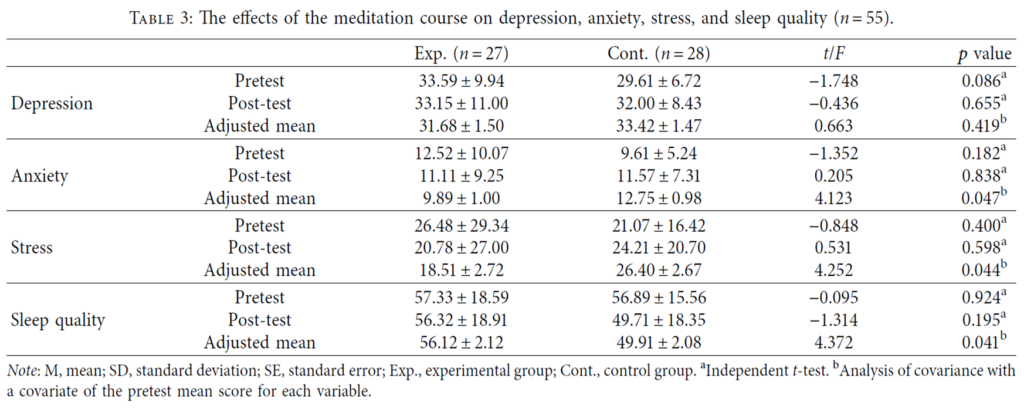Effects of an On-Campus Meditation Course on Depression, Anxiety, Stress, and Sleep Quality among South Korean Paramedic Students
출처
Perspectives in Psychiatric Care, 11 May 2023, https://doi.org/10.1155/2023/3003004
연구자
Yang Gyeong Yoo(Professor, Department of Nursing, Kunsan National University),
MiRa Yun(Professor, Department of Nursing, Chung-Ang University),
In-Soo Lee(Professor, Department of Paramedic Science, Korea National University of Transportation),
Hyeyoung Kim(Professor, Department of Culinary Arts, Woosong University),
Sang Gyun Roh(Professor, Department of Emergency Medical Services, Sunmoon University),
Boas Yu(Professor, Henry P. Becton School of Nursing and Allied Health, Fairleigh Dickinson University)
1. Introduction
College students face various stressful situations and experience various mental health problems as they transit from adolescence to adulthood. Paramedic students face more stress than most other students as they prepare to become the emergency medical workers of the future. Such additional stress is associated with acquiring professional medical knowledge, adapting to different environments (academic, clinical, and emergency), and being exposed to traumatic events.
Nevertheless, many Korean college students are reportedly reluctant to treat their mental health problems via psychiatric medication, preferring alternative treatments, and self-management. Moreover, a multimodal approach, combining pharmacotherapy with self-management methods, is reportedly more effective than monotherapies in treating patients with mental disorders. These results highlight the urgent need to develop an easily accessible self-management program to improve students’ mental health.
To date, very few studies have been conducted on the effects of meditation courses as a part of paramedic curriculum. Therefore, we performed this quasiexperimental study with the aim to investigate its specific effects on depression, anxiety, stress, and sleep quality.
2. Materials and Methods
Participants.
The paramedic students in this study were recruited from two similar-sized universities in different provinces of South Korea. To avoid possible treatment diffusion, the experimental and control groups were recruited from different locations. Given that the professor who developed and conducted the meditation course was employed at K University, third year paramedic students who volunteered from this university were assigned into the experimental group. Third year paramedic students from the geographically distant G University were recruited for the control group. 55 college students were included in the analyses, with 27 in the experimental group and 28 in the control group.
Ethical Considerations and Data Collection.
The experimental group attended the meditation class three times a week for eight weeks, with each class lasting 50 minutes, from September 23 to November 15, 2019. During the same period, the control group attended only their regular classes. The pretest data were collected one week before the meditation course, and the post-test data were collected one week after the course was completed.
Intervention.
The True Self meditation method consists of seven progressive levels and is focused on discarding attachments to return to one’s original true mind. A negative mindset and false perceptions can be eliminated and cleansed through the mind subtraction method, which can expand one’s universal consciousness and reveal one’s True Self (a positive mindset).
For the meditation course in this study, we used the methods from only the first of the seven progressive levels. The students were given a short lecture, at the start of each class, on the principles of the human mind and the fundamentals of meditation, followed by the meditation practice for 20~25 minutes, primarily focusing on self-reflection and eliminating one’s negative mindset.
Measurements.
The Center for Epidemiological Studies-Depression (K-CES-D) Scale.
The Beck Anxiety Inventory (BAI).
The Stress Response Inventory (SRI).
The Leeds Sleep Evaluation Questionnaire (LSEQ).
Data Analysis.
The data were analyzed using IBM SPSS Statistics for Windows version 24.0.
3. Results
Table 3 shows the changes in depression, anxiety, stress, and sleep quality scores in the experimental and control group before and after the meditation course.
Using an ANCOVA to account for the pretest scores, we verified that the depression scores of the experimental (31.68±1.50) and control (33.42 ± 1.47) groups did not differ (p=.419).
An ANCOVA, accounting for the pretest scores, revealed that the experimental group’s posttest score (9.89±1.00) was lower (p=.047) than the control group’s post-test score (12.75±0.98).
An ANCOVA, accounting for the pretest scores, revealed that the experimental group had a lower (p=.044) post-test stress score (18.51 ± 2.72) than that of the control group (26.40±2.67).
An ANCOVA, accounting for the pretest scores, revealed that the experimental group had a higher (p=.041) post-test sleep quality score (56.12±2.12) than the control group did (49.91±2.08).

4. Conclusions
This quasiexperimental research study examined the effects of an on-campus True Self meditation course for paramedic students. This study found that the inclusion of a meditation course within college paramedic curriculums is feasible, and its utilization may benefit students in terms of their mental health and sleep quality.
In this study, the True Self meditation college course improved students’ mental health. Developing and offering this on-campus meditation course may be a suitable strategy to enhance students’ psychological well-being, especially for students with health-related majors, such as paramedic or nursing students. Colleges need to consider the benefits of such programs and encourage students to incorporate meditation into their campus lives.